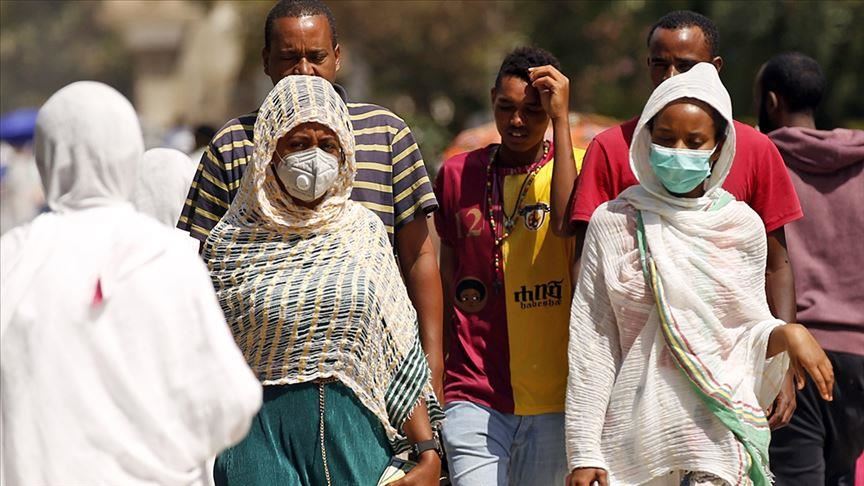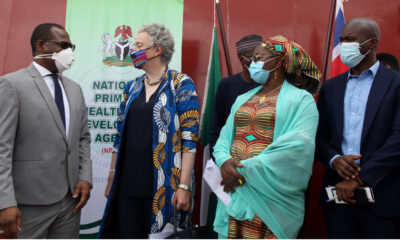Headlines
COVID-19: Nigeria’s Informal Economy Hit Hard

If not for the recent effect of the COVID-19 outbreak in the country, Nigeria’s informal economy has grown considerably over the last decade.
These are the individuals and micro-enterprises whose economic well-being is birthed and buoyed on the fringes of the formal economy; business activities that remain unregulated, and oftentimes, completely unknown.
Initially, much of the rhetoric centred on the need to ‘manage’ this ever-expanding behemoth that the informal sector was becoming. This narrative has since evolved into one that seeks to formalise these businesses, by catering to their needs and providing them with much-needed support.
Providing “no-interest micro-loans”
This is what we have focused on through our Bank of Industry capacity building initiatives, and our microcredit schemes, which are designed to provide no-interest micro-loans to micro-enterprises to support their growth.
As a result of these initiatives, we have been able to gain a better understanding of what these micro- and small businesses in the informal sector truly need: firstly, access; secondly, skills; and thirdly, tailored service delivery and channels of access.
With the onset of the coronavirus pandemic however, the challenges we had previously begun to understand have been magnified considerably.
READ COVID-19: The Battle Is Not To The Strong…
The sector is vast and encompasses a host of activities, ranging from agriculture and food production to mining, trade, transportation, accommodation, and even recreation services, amongst many others.
Various reports over the past few years have surmised that the sector, which accounts for over half of global employment, could be worth approximately N40 trillion in Nigeria.
Lagos’ growing informal economy sector
In Lagos state alone, the informal economy employs about 5.5 million people – about three-quarters of the state’s 7.5 million labour force. A study released in 2016 revealed that the informal sector made 41%3 of contributions to Nigeria’s national GDP; a few years later, in 2018, this portion had risen to 65%.
If one were to proffer an estimation, it could very well be posed that with steadily increasing growth and activity, the informal sector’s contributions to our 2019/20 GDP would potentially surpass 70-80%.
However, this year is unlike any we could have imagined – and for those whose welfare is reliant on the daily income of the informal sector, and who cannot “work from home”, the reality is bleak.
Despite the delayed onset of the virus in the Nigerian environment, compared to the West, the impact of government measures to curb the spread of the pandemic, though necessary, have affected almost all micro-businesses.
Take Salewa, for example
She runs a small market stall at Mushin, selling cosmetic products; for years, this has been a reliable source of sustenance for Salewa and her growing family. With the income from her shop, Salewa contributes to funding the education of her two sons and cares for her ageing mother. As the population of Lagos has steadily increased, so has demand for her products, and ultimately, her revenue.
Identifying the benefits that business expansion could create, she acquired a small loan early this year, and invested in a second stall at another market; it wasn’t long before she began to see returns on her investment.
That was in February.
Today, however, since the government imposed lockdown and restricted movement measures across the country, demand for her products (for which she had relied on foot traffic) has come to a complete standstill and restocking any previously sold stock is proving difficult and more expensive.
In less than two months, Salewa’s household has become a single-income household. Her husband, who runs a private taxi service, has gone from approximately twenty customers a day, to about three to four customers a week.
READ: COVID-19: E-commerce Companies Cry Out Under Weight Of Restrictions By Government Security Operatives
Still, despite this harsh reality, Salewa and her family are in a better position than the millions of individual construction workers, tradesmen and women, restaurant service workers, street vendors, market salespeople, and the millions of low-income Nigerians whose livelihoods have disappeared.
A few weeks ago, the National Bureau of Statistics released a report which revealed that 4 in 10 Nigerians currently live below the poverty line – an estimated 41% of the population (82.9m individuals).
“Informal sector remains incapacitated”
This was an improvement from the rate of poverty in 2018 (which was at nearly 50%, an estimated 86.9m people), and yet, as the informal sector remains incapacitated, the ripple effect will eventually lead more people to regress into abject poverty, undoing much of the progress that may have been made in recent years.
The challenges are multi-tiered, and the current outlook looks bleak, but the road ahead will be determined by the responses of various stakeholder groups today. There is no doubt that for these micro-enterprises and entrepreneurs in the informal sector, the rebuilding process will outlast the existence of the COVID-19. So, where do we begin?
It goes back to my earlier statements regarding the needs of the informal sector:
- access
- skills
- tailored service delivery and channels of access.
The government has rolled out important relief measures, which include the provision of financial palliatives to over 11 million Nigerians listed on the National Social Register; but, considering that the estimated need potentially cuts across nearly 100 million people, there are still significant lengths left to be taken.
READ: How Businesses, Govt Can Re-Strategize After Coronavirus
In South Africa, the government has launched a Debt Relief Fund to help small businesses; this is not dissimilar to the $136m credit relief fund set up by the Central Bank of Nigeria, which is also designed to support small businesses affected by the COVID-19 pandemic.
However, the difference is, where the approach in South Africa has adopted the input of both public and private sector stakeholders, Nigeria’s has not.
Also in South Africa, the country’s National Empowerment Fund is providing support to entrepreneurs to manufacture products to support in the fight against COVID-19 e.g. PPE, thus creating new business models that can thrive in the current climate, and furthermore, driving enhanced innovation and increased private sector participation alongside government efforts.
READ: What Business Leaders Must Change From Survival To Thriving
What the border closures have resulted in is an increased need to look within our shores for the goods and services we require – from an individual and a business perspective; there are increased opportunities to create business linkages between the formal and informal sector.
Tailored support and service delivery looks different now
Taking into consideration the current state of these businesses, many financial service providers have adopted moratoriums and reduced/no interest rates for small businesses.
The same approach has been adopted on the Tradermoni and Marketmoni initiatives of the Federal Government of Nigeria, being executed by the Bank of Industry.
But even beyond this, the Bank of Industry is driving a series of other microcredit and intervention programmes, such as the North-East Fund as well as special funds targeted at states.
The fact is, our informal sector is too large and too fragile for a total lockdown to be effective – or practical – in the medium term.
So our efforts must shift quickly and concertedly towards encouraging and enabling the safe operation of our informal sector through this pandemic – as we await the discovery of a cure and vaccine.
It is imperative for actors in our informal sector to understand the measures required to protect themselves and their customer bases, and have increased access to these measures and tools – i.e. access to PPE, sanitary infrastructure for handwashing and sanitizing, and access to health kits for frequent health checks.
COVID-19: Need to adopt new skills to enhance the ease of operations
One significant revelation of this pandemic is the strength and importance of leveraging digital tools across the entire value chain: from financial transactions and services to customer service and beyond.
Capacity building will need to include efforts at upskilling micro- and small businesses in the ins and outs of digital transformation, to enable them to engage directly with their clients and customers, and limit physical interactions as much as is realistically possible.
Tomorrow’s business world looks radically different from today’s. However, one thing is certain: our micro-entrepreneurs and small businesses can become a harnessed economic force if we make the concerted efforts to empower them.
These efforts clearly require the collective contributions of our private sector and government stakeholders and must be holistic and sustainable if they are to have the desired impact.
This approach is one we have started to adopt- one where we seek to equip our informal sector with the necessary tools to foster their own growth and to seek out ways to include them financially in our formal economic structures. In the wake of COVID-19, the intensity, the approach, the quantity and quality of our participation will need to be accelerated, refined, and expanded.
Written by: Toyin Adeniji

















